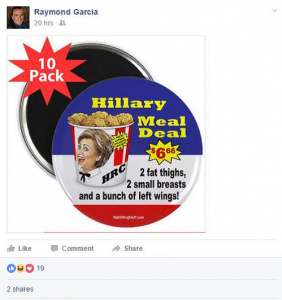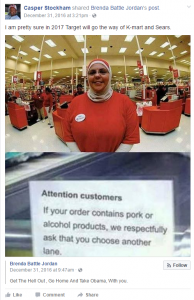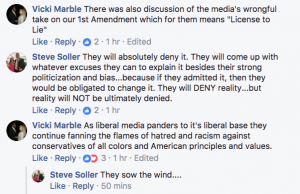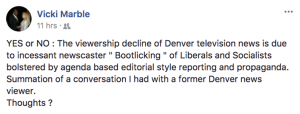Ingold: Friends, we are undergoing an exciting change here at The Denver Post, but it might not seem like a great deal at first. Please give me a minute to convince you otherwise… (Thread 1/?)
Starting today, we are limiting how many stories you can read online for free and asking — begging — you to buy a digital subscription. It’s a good deal: $11.99 per month. [even better is the 99 cent deal for the first month.]
But it’s also something much more than access to articles. It’s an investment in your community.
The Denver Post is not nearly as big as it was, and it doesn’t cover as much ground. That makes me sad, too. But it’s still the state’s biggest news organization, it’s part of Colorado’s history and it produces dozens of important stories every year you won’t see elsewhere.
Remember @KSimpsonDP’s heartfelt portrait of the practical flaws in Colorado’s aid-in-dying law?
Or @JBrownDPost’s searing reporting on immigrants who have to wait until they are near death before they can get dialysis?
What about our Colorado Divide series showing how rural Colorado is being left behind — a conversation that @GovofCO picked up in last week’s State of the State address? https://www.denverpost.com/tag/colorado-divide/ …
I’ve been here 17 years, and in that time laws have been passed, bad people have gone to jail, crimes have been thwarted and good lives have been saved because of the work of The Denver Post.
I’m not exaggerating this. I once wrote a story about a woman suffering from HIV/AIDS and chronic pain. She felt alone, abandoned. Years later, I saw her again and she looked amazing. And she told me that our story, photos and video saved her life — by showing her someone cared.
But here’s the thing about all these good works: As much as we at The Denver Post want to think of ourselves as a nonprofit community organization, we aren’t. We’re a business owned by a New York hedgefund that demands it gets its cut every year.
And death is on our heels.
The basics of our looming death are familiar: Advertisers are leaving print media, and pretty much every newspaper in America — including the New York Times — is seeing declines in print advertising dollars.
We and just about everyone else have tried to compensate for those losses by putting greater emphasis on online advertising. There’s a reason the company that owns us is called Digital First Media. But this won’t work.
Why? Because it does two things. First, it gives a lot of power to the tech platforms where readers find us — like Google and Facebook. And those platforms have been making decisions that stab virtual knives in our backs.
Take, for instance, Google’s latest changes to discourage websites from hosting auto-play and take-over ads. That’s great, right? I hate those things!…
…Except, annoying as they were, those ads brought in money that helped sustain our journalism.
Or what about Facebook’s newly announced changes to the news feed — designed to make you interact more with friends and family?…
…Well, they mean you’ll be seeing (and clicking) fewer Denver Post stories. Right now, Facebook accounts for about 13% of the traffic to my stories.
There’s another thing this focus on digital ad revenue does: It can warp news judgment and news values.
Think about what kinds of stories you want your local newspaper to cover. Does that list include Golden Globes red carpet slideshows? What about bizarre crimes committed by Florida Man? In a model where clicks = cash, you’ll likely see a lot of those latter stories.
Here’s an example: I’ve spent much of the last six months writing about health policy, Medicaid, CHIP, and Obamacare — big state and national issues that affect a lot of people. What’s my most-clicked story? A goofy thing about eclipse glasses.
Meanwhile, this story looking at what Colorado Medicaid is doing to reduce opioid overdoses got fewer than 1,000 clicks.
I get that it’s wonky and incremental and not at all sexy. But here’s the question: Would you rather have someone reporting on this kind of thing or not? Because that’s the choice. It’s not between fun stories and dull ones. It’s between community-centered journalism and oblivion
There might be quality publications that can make a business model based on online ads work. But they will be national ones, with enormous reader pools to draw from. Local publications don’t have that advantage.
And the hedgefunds taking over local media don’t care. They want revenue. If that means fewer stories about the local city council and more about celebrity sideboob, that’s what it means.
So what’s the solution? We need to join our community values as journalists with a business model for which those values are rewarded. We need to be able to make money *because* we (and you) care about our city. And this is where you come in.
This isn’t a charity pitch. If you pay for a Denver Post subscription, you’re getting more than symbolic value in return. You’ll be getting articles that help you make more knowledgeable decisions and be a more informed voter.
But you’ll also be making a statement that the people and the stories in your community matter, that they’re worth hearing. That you want someone watchdogging city council meetings. That you care about the consequences of state policy.
And because you’re paying for everything together, your money is supporting ALL of our work. Some months you want to read about the Broncos. Others about groundwater pollution. Either way, we’ll have you covered, and a reporter’s beat won’t depend on a few clicks here or there.
This also, frankly, gives you greater power to shape the news coverage in your community. You don’t like something we did? Great, because you’re not just a click on the website, you’re a subscriber! Call us up and give us an earful and demand that we listen.
There are a lot of great news organizations in this state and all of them are worth supporting. This isn’t an either/or. Watch the TV newscasts. Contribute to public radio. Read the alternative publications. Everybody is out there for sincere reasons.
But I can’t state this any more clearly: If you want to see a future where there’s a Denver Post in Denver, buying a digital subscription now is the best idea we have to make sure that happens.
I hope you agree, and, at the very least, I appreciate you humoring me for this tweetstorm. Thank you for reading over the years. Thank you for caring about Colorado. Thank you for thinking about subscribing: https://checkout.denverpost.com/subscriptionpanel … (Thread: End/Phew!)
Thanks everybody for the thoughtful replies to this thread! It’s so heartening to see how many people care about local journalism. Plus, an update: We’re running a special where you can get your first month’s access to The Denver Post for 99 cents:
 Two 2016 GOP candidates, known for posting false and inflammatory information on Facebook, are running again in 2018.
Two 2016 GOP candidates, known for posting false and inflammatory information on Facebook, are running again in 2018.


 Veteran Denver Post reporter John Ingold banged out a beautiful
Veteran Denver Post reporter John Ingold banged out a beautiful 



